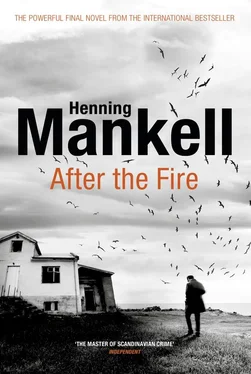In the evenings I read the book from 1833, the one about the capture and care of songbirds. I still couldn’t work out the connection between my grandfather and the birdcage. I had put the jar of birdlime on the shelf above the kitchen sink.
I woke earlier than usual on the morning I was due to pick up Lisa Modin. The sun still hadn’t shown itself when I went down for my dip.
After breakfast I got into my boat and tried the engine. It started right away. I was nervous about seeing Lisa. I tried to set aside any expectations. She was still a young woman, in contrast to the old man I had become. The omens were hardly favourable when it came to love.
I moored by the petrol pumps an hour before she was due. I wandered around and saw that the repairs to the coastguards’ jetty had been completed. The big vessel was out; I knew that they had an extensive area to patrol.
There is a noticeboard on the quayside by the bus stop. One of the things that brings home the passage of time most powerfully to me is the sight of old, peeling posters about summer festivals or outdoor dance parties. There were also handwritten adverts for smoked whitefish or live rabbits. The bus timetable was shredded, but I couldn’t tell whether the wind or an angry traveller was responsible.
I walked up to my car. Oslovski’s door was closed, but the dead crow had been removed. I didn’t hang around; I didn’t want to risk Oslovski appearing and demanding that I take her blood pressure.
A cat that I think belonged to the grocery shop was padding across the quayside. Its presence reinforced the sense of desolation. A graveyard of summer memories. I stared at the window display in the chandlery: rucksacks, tins of paint, a selection of anchors.
I still had half an hour left before Lisa Modin arrived. I walked right to the end of the jetty, balancing on the rubble that made up the outer defences of the harbour, then came back again.
It was ten past ten when her car appeared, by which time I had begun to think she wasn’t coming. She parked outside the chandlery’s storage depot, which isn’t actually allowed.
She was wearing a bright yellow raincoat, with an old-fashioned sou’wester in her hand. A small rucksack hung over one shoulder.
‘I’m always late,’ she said apologetically.
‘No problem. It’s many years since I was in a hurry.’
I took her rucksack and held out my hand to help her into the boat, but she put one foot on the step cut into the quayside and grabbed hold of the iron ring. I cast off and started the engine. The sound sliced through the silence. I caught a glimpse of Veronika at the window of the apartment next to the grocery store and waved at her.
The weather was calm. We puttered slowly out of the harbour. Lisa Modin was sitting in the prow; she flung her arms wide.
‘Which way are we going?’ she shouted.
‘North-east,’ I replied, pointing. I increased my speed.
Lisa seemed to be enjoying the fresh autumn air. She closed her eyes.
I set my course towards the island of the poor people.
The sea opened out, the skerries grew sparser, smaller, barer, the low-growing plants cowering in the crevices in the rock. Bracken, crowberry, cotton grass, sometimes even dwarf cornel. Further out there was salt grass and sea spurrey, silver cinquefoil and violas. We couldn’t see them from the boat, but I knew they were there.
Cool spray from the choppy waves blew in our faces. Vrångskär itself was quite isolated, at the far reaches of the archipelago. It was mainly composed of gneiss rock, its steep sides plunging into the sea. I slowed down as we approached the southern headland. Lisa Modin looked at me and smiled.
We rounded the skerry, with its small deep-cut inlets and heather-covered areas of flat land. The bedrock itself was grey, mixed with serpentine streaks of dark red sediment. Towards the north there was a tumbledown cairn which had once acted as a navigation mark for one of the navy’s secret shipping lanes.
‘Where did the people live?’ Lisa asked.
‘There are dips and hollows that can’t be seen from the sea,’ I explained. ‘They built their houses where there was some protection from the wind.’
On the western side there is a natural harbour where the skerry divides in two, with a steep rock face on either side of the inlet. I switched off the engine and allowed the boat to drift towards the shore.
In order to get to the large low-lying area we had to take the long way round, scrambling over slippery moss-covered rocks. I offered to carry Lisa’s rucksack, but she shook her head and looped it over her shoulder.
We passed a dense thicket of wild roses. I broke off a late autumn bloom and gave it to her.
‘This was planted by people,’ I said. ‘According to someone who knows, it’s been growing here for almost two hundred years.’
She tucked the rose into the breast pocket of her raincoat, and soon the hollow that had once housed a settlement was spread before us.
Many years ago my grandfather and I had accompanied a group of archaeologists on a summer expedition to Vrångskär. I could still remember in detail what the team leader had said about the fishing community that had disappeared so long ago.
I showed Lisa the remains of the foundations; at most six houses and the same number of outhouses had stood here. The possibilities for animal husbandry were limited because there was only enough fodder for one or two cows. People had moved out here in the eighteenth century, and the level of poverty they suffered is unimaginable today. The total population of Vrångskär was in the region of forty individuals, and their livelihood depended on fishing. Nets and rowing boats were the essential elements of their lives. If the nets were out when a storm suddenly blew up, they had to go and bring them in. There are many tales of men and women who failed to save their nets. I have never forgotten one story which took place in the 1790s. A storm swept in from the north-east with no warning. Nils Eriksson, a young fisherman, and his wife Emma immediately went out to rescue their nets, but their boat capsized. Neither of them could swim, and they both perished. Emma was later found entangled in one of their own nets. Nils’ body was never recovered.
Five young children were orphaned that day. There is no record of what happened to them.
I led Lisa over to the best-preserved foundation. According to the archaeologists, this had been one of the largest houses on Vrångskär. It consisted of a single room that may have housed as many as ten people.
We sat down on a flat rock beside the place where the poorest of the poor must have constantly wondered if they were going to survive. God knows how they coped during winters when the ice was neither thick enough to travel over, nor thin enough to break through so that boats could be used.
‘But someone must have lain down in the grass on a summer’s day, looked up at the sun and thought: this is my home,’ Lisa said.
I don’t know why I did it, but I got up from the rock and lay down in the sparse yellow autumn grass.
‘The people who lived here had neither the strength nor the time,’ I said. ‘Women gave birth out here; I expect they lay down then. Most babies died during the first few months.’
Lisa looked at me.
‘Tell me more,’ she said. ‘Show me what else there is to see.’
I rejoined her and pointed to a couple of stones in the grass that might also have been part of the foundations of a house once upon a time.
‘I come out here sometimes and sit and look at those stones. Occasionally I get the feeling that they are moving with immense slowness. I think perhaps they are on their way back to the place from which they originally came. This skerry is in the process of reverting to what it used to be, before the people arrived.’
Читать дальше












